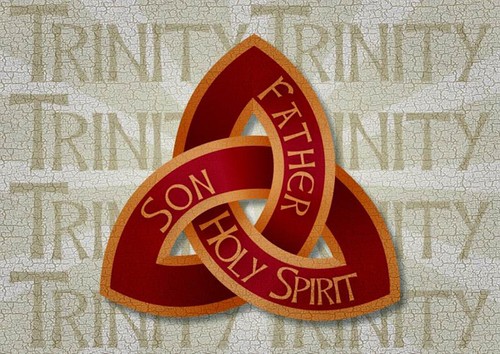holy trinity is ultimate mystery of faith

Although Pentecost Sunday officially ends the Easter Season, the following two Sundays are special for the Church. On the Sunday after Pentecost, the Church celebrates the Most Holy Trinity, the doctrine that most identifies us as Christians. And on the second Sunday after Pentecost, she celebrates the Most Holy Body and Blood of Christ (Corpus Christi), the belief that most identifies us as Catholics. This week I will write about the Most Holy Trinity, and next week, I will write about the Most Holy Body and Blood of the Lord.
Most priests dread when the feast of the Most Holy Trinity comes around, for the temptation is to try to explain how God can be both One and Three. No priest understands this clearly himself, as it is the ultimate mystery of our faith, so he cannot adequately explain it. We do not believe in the Trinity because we have reasoned our way to that belief, but because Jesus Himself has revealed this doctrine to us.
The Jewish people had always believed in the One God, since God revealed Himself to Moses in the Burning Bush. The entire Old Testament tells us the story of the struggle of Israel to hold on to this belief, in the face of all of their neighbors, friendly and hostile, who were pagans, believing in many gods. Throughout her history the people of Israel were tempted to not only believe in the God of Moses, but to hedge their bets by offering worship and sacrifices to these other gods. When Jesus came, Israel was much more settled in her belief in monotheism, and all of the Jewish groups of the time clearly taught faith in one God. That was never a point of conflict between Jesus and the Pharisees and Sadducees.
But the early Christians began asking difficult issues after Jesus ascended to the right hand of the Father. Was Jesus God or was He human? If He was God, then who was this Father that He prayed to? And who was this Holy Spirit who He promised to send upon them after His Ascension? Is there one God, or are there two Gods, or are there three Gods?
The first four centuries of the Church saw various debates about this, and various explanations of how God could be One and more. The Council of Nicaea, in 325 ad (we are celebrating the 1,700th anniversary of that important Council this year), officially declared that there is one God, in three co-equal persons, Father, Son and Holy Spirit.
Virtually all Christian denominations accept this definition, even if they disagree in many other ways. Hence, the Doctrine of the Holy Trinity is the one that marks us as Christians. If you do not accept this definition, then you are not Christian.
Most priests dread when the feast of the Most Holy Trinity comes around, for the temptation is to try to explain how God can be both One and Three. No priest understands this clearly himself, as it is the ultimate mystery of our faith, so he cannot adequately explain it. We do not believe in the Trinity because we have reasoned our way to that belief, but because Jesus Himself has revealed this doctrine to us.
The Jewish people had always believed in the One God, since God revealed Himself to Moses in the Burning Bush. The entire Old Testament tells us the story of the struggle of Israel to hold on to this belief, in the face of all of their neighbors, friendly and hostile, who were pagans, believing in many gods. Throughout her history the people of Israel were tempted to not only believe in the God of Moses, but to hedge their bets by offering worship and sacrifices to these other gods. When Jesus came, Israel was much more settled in her belief in monotheism, and all of the Jewish groups of the time clearly taught faith in one God. That was never a point of conflict between Jesus and the Pharisees and Sadducees.
But the early Christians began asking difficult issues after Jesus ascended to the right hand of the Father. Was Jesus God or was He human? If He was God, then who was this Father that He prayed to? And who was this Holy Spirit who He promised to send upon them after His Ascension? Is there one God, or are there two Gods, or are there three Gods?
The first four centuries of the Church saw various debates about this, and various explanations of how God could be One and more. The Council of Nicaea, in 325 ad (we are celebrating the 1,700th anniversary of that important Council this year), officially declared that there is one God, in three co-equal persons, Father, Son and Holy Spirit.
Virtually all Christian denominations accept this definition, even if they disagree in many other ways. Hence, the Doctrine of the Holy Trinity is the one that marks us as Christians. If you do not accept this definition, then you are not Christian.